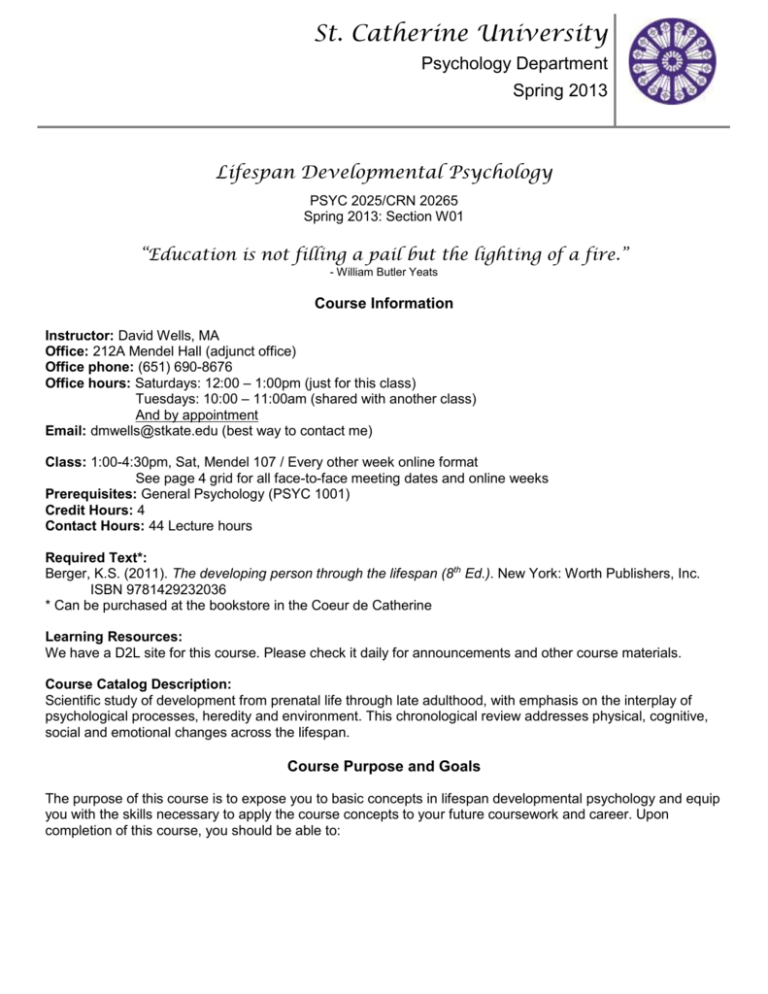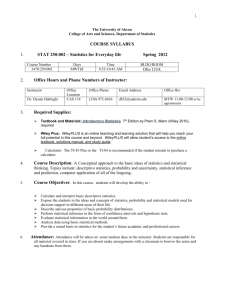PSYC 2025 (Hybrid) Spring 2013 syllabus
advertisement

St. Catherine University Psychology Department Spring 2013 Lifespan Developmental Psychology PSYC 2025/CRN 20265 Spring 2013: Section W01 “Education is not filling a pail but the lighting of a fire.” - William Butler Yeats Course Information Instructor: David Wells, MA Office: 212A Mendel Hall (adjunct office) Office phone: (651) 690-8676 Office hours: Saturdays: 12:00 – 1:00pm (just for this class) Tuesdays: 10:00 – 11:00am (shared with another class) And by appointment Email: dmwells@stkate.edu (best way to contact me) Class: 1:00-4:30pm, Sat, Mendel 107 / Every other week online format See page 4 grid for all face-to-face meeting dates and online weeks Prerequisites: General Psychology (PSYC 1001) Credit Hours: 4 Contact Hours: 44 Lecture hours Required Text*: Berger, K.S. (2011). The developing person through the lifespan (8th Ed.). New York: Worth Publishers, Inc. ISBN 9781429232036 * Can be purchased at the bookstore in the Coeur de Catherine Learning Resources: We have a D2L site for this course. Please check it daily for announcements and other course materials. Course Catalog Description: Scientific study of development from prenatal life through late adulthood, with emphasis on the interplay of psychological processes, heredity and environment. This chronological review addresses physical, cognitive, social and emotional changes across the lifespan. Course Purpose and Goals The purpose of this course is to expose you to basic concepts in lifespan developmental psychology and equip you with the skills necessary to apply the course concepts to your future coursework and career. Upon completion of this course, you should be able to: 2 Student Learning Outcomes 1.) 2.) 3.) 4.) 5.) Identify and interpret key lifespan development concepts Exercise critical thinking skills Apply developmental concepts to real world situations and problems Work collaboratively with your classmates and contribute to our classroom learning community Employ professional writing Method of Assessment Exams and papers In-class/online activities, exams, papers In-class/online activities, exams, papers In-class/online activities Papers Expectations In order for us to satisfy the aforementioned objectives, we must be clear and open about our expectations for each other. Below are my expectations for you and myself for the next 16 weeks: My expectations for YOU: Come to class on time and be prepared to actively participate in the class. Engage actively in online discussions/activities/assignments independently and with others as assigned. Be respectful of others’ values, beliefs, and learning styles. Be open to others’ opinions and views and respectfully share yours. Turn in assignments on time and take exams on time. Work hard and put forth an honest effort. Ask questions when you have them; ask for help when you need it. What you can expect from ME: I will come to class prepared, begin on time, and end on time. I will not lecture for the entire class period. I will take breaks to facilitate discussions, to illustrate concepts, and structure activities in which students can learn from each other. I will not force students to participate, but I will encourage students to do so. I will create a classroom and online environment that is respectful; I will not tolerate disrespect. I will take all questions, concerns, and comments seriously and respond in a timely manner. I will provide helpful feedback on all assignments that are earnestly submitted. I reserve the right to not grade or comment on assignments that were only partially completed or otherwise show lack of effort. Course Requirements (All requirements below are still in progress and subject to change) In order to satisfy the requirements of this course, you are expected to attend lecture every other week, engage in online discussion and activities on the alternate weeks and complete the assignments listed below. During our class I will lecture, arrange small group activities and facilitate discussions. Online, I will organize small groups for topical discussions, arrange activities and submit materials to be utilized for assignments and application of course content. 1. In-Class Participation. Throughout the semester we will dedicate some in-class time to integrating and synthesizing the course material through discussions and activities. There will be points assigned for a number of these in-class activities as a means for rewarding both attendance and participation. More information will be provided regarding these activities as the semester progresses. 2. Online Participation. Each of the online weeks (dates designated on the calendar at the end of this syllabus) for this semester will follow a similar format. The specific assignments/postings are still pending. a. I will post some sort of audio/video clip related to the course content we discussed in our previous inclass meeting. b. I may post a relevant article (e.g., peer-reviewed journal article, popular press, etc…). 3 c. I may also provide any brief but remaining content that we did not get to in our in-class meeting. b. There will be a short 10-12 item quiz based on the content from the in-class meeting and/or the clips/articles. c. There will also be small group discussions/activities organized for each online week. I will have identified a few particular activities for each week. However, in order to keep this format both relevant and interesting, I will regularly check-in with the class to solicit additional ideas/suggestions for these activities. One student from the group will also be assigned to summarize/present these discussions to the remainder of the group during our next in-class meeting. Yes, participation in these discussions/activities are mandatory and you must pass the online component of the course to pass the course. I will not only provide a general grading rubric but I will also frequently join your discussions/activities with further questions/comments/directions in order to facilitate meaningful dialogue. ** A few specific due dates and times during each online week will also be provided with the grading rubric in order to assure that the “discussions” do not all happen during the final day of the online week. The intention for this participation is that it is ongoing and thoughtful rather than sudden and crammed. We’ll talk about this more in class. 3. Observation Paper. Historically, the day program has required PSYC 2025 students to report observations made over the course of a one-hour visit to the Early Childhood Center (ECC) and to reflect on their experience. The observation of children’s behaviors in naturalistic settings is one of the more powerful tools we have in describing and ultimately understanding developmental phenomena. However, it is more than likely that we will not be utilizing the ECC for this assignment due to the limited schedules of availability for evening/weekend students in this department. Instead, we will be creating an assignment that honors the spirit of applying the observational method to core concepts in human lifespan development that works with people’s schedules/interests. This paper will be 4-6 double-spaced pages. You will receive more information on this assignment later in the semester. (Points still to be determined). 4. Interview Paper. The goal of this paper is to bring course material to life through its application to ‘real life’ situations and stories. Your assignment will be to do a one-hour interview with someone in your life (at least over the age of 12) and then to write a paper analyzing the interview data through the lens of course material. This paper will be 4-6 double-spaced pages. A more detailed description and grading criteria will be provided during the first few weeks of class. (Points still to be determined). 5. Group Presentation. The goal of this presentation (currently scheduled for our last in-class meeting) is to assess your ability to think critically, work collaboratively, and integrate course material across multiple sources and topics. Your assignment will be to choose one stage of the lifespan (e.g., Adolescence), identify a problem associated with this stage, and develop 3 possible interventions for this problem based on course material and a few outside sources. Some time in class will be provided to work in your small groups (3-4 people), but you will also be strongly encouraged to utilize the online discussion boards based on your own availability for work on this project. A more detailed description along with grading criteria will be provided during the first few weeks of class. (Points still to be determined). 6. Final Exam? We are required to have some sort of final exam/project/assignment for the semester. This will likely be a combined cumulative quiz (i.e., the same format as all previous quizzes but a bit longer, 2025 items) as well as a written component for you to integrate your learning experiences from the course as well as the group presentation. Further instructions will be provided later in the semester. (Points still to be determined). ** Psychology Major/Minor? Save your papers! You may need them for your senior portfolio. 4 Grading The following tables show how I will evaluate your performance in this course. Please let me know if you have concerns or questions about your grade – the earlier the better. I want you to succeed in this course and I will do everything I can to help you meet your goals. Also, I strongly recommend the services of the O’Neill Center for Academic Development for assistance with time management, writing, and studying for exams. Grades in this course will be based on points. You will receive points for all of the assignments listed in the table below. Your final grade will be the sum of your total points divided by the total points for the course. If you would like to discuss or dispute a grade, I am happy to have an honest and respectful dialogue with you before making my final decision about the grade. See the policy section for information about late work. Required Assignments In-class participation Online participation (quizzes, disc, etc…) Observation paper Interview paper Group Presentation Final Exam Total points Points Grading Scale ? ? ? ? ? ? ? A 93-100% A- 90-92% B+ 87-89% B 83-86% B- 80-82% C+ 77-79% C 73-76% C- 70-72% D+ 67-69% D 60-66% ** Scores below 60 are failing (F) Class and University Policies Attendance & Participation I expect you to attend class and be on time. I also expect that you fully engage in the online portion of this class on the weeks that we do not meet in person. The weeks that we do not meet in person will be referred to as “online weeks” NOT “off weeks.” It is important that all students approach the online weeks with as much energy, focus and seriousness as our face-to-face weeks. The workload will not be lighter. The online environment is meant to be a continuation and expansion of our work together. I advise you to participate as actively as you are comfortable so that there is a seamless flow of pacing and energy between our face-to-face and online weeks. If you choose not to attend class or engage in the online weeks without previously discussing it with me, I will not provide you with notes, handouts, announcements, or any other materials that you missed. You should get these materials from another willing classmate instead. Also, if you are late to class you are responsible for getting the information you missed from a classmate. If you are going to miss class for a legitimate reason (illness, family emergency, car trouble, etc.) you must contact me as soon as possible to discuss how to make up what you will be missing. I expect that you will contact me before classes and/or online weeks start for any and all of these reasons. Late Work Late work will not be accepted unless you and I discuss the parameters and create a plan before it’s due. Extra Credit One extra credit assignment will be allowed during the semester where you can earn up to 10 points. This assignment is optional and will be due on the last day of class (May 18th). Further details about the assignment will handed out in class during the first half of the semester. Incompletes A grade of incomplete is given only when unusual circumstances deem it appropriate. Ordinarily, such circumstances would involve matters that are not wholly within your control (e.g. illness, family stress, death of a loved one, etc.). If you wish to receive an incomplete, you must complete a Petition for Incomplete Grade form (available online) no later than the last day of the term in which course requirements are due. You must be making satisfactory progress in the course and you must have completed 75% of the course at the time the petition is filed. Incompletes are awarded at the instructor’s discretion. If granted, the normal deadline for 5 completion of the work is no more than 8 weeks after the last day of classes. If you complete the course requirements in the time allotted, the instructor will submit the final grade by the deadline. If you think you might want an incomplete in this class, please talk to me as soon as possible so we can make a plan. Classroom Conduct Preparation and Participation I expect you to come to class prepared, meaning that you will have read the assigned course materials and completed the necessary assignments. I also expect you to participate in class and in the online format to the best of your ability. I try to make this class as interactive as possible, but I can only do this with your help. Cell Phones Cell phones are not to be used during class, and this includes texting. If you need to take a call, step outside. Please show respect for everyone else in the room. Personal Computers Computers should be used in class to enhance your learning; they should not be used for other purposes. If I notice people using computers for non-school related activities I will ask people to put them away. Please let me know if you are distracted by another student’s computer use. We all deserve the right to learn in a respectful environment. Disruptive Behavior Any student who is behaving in a way that disrupts the learning of other students will be asked to leave the classroom. Please let me know if another student’s behavior is getting in the way of your learning and I will do my best to mediate the situation. Academic Integrity The Psychology Department has a zero tolerance policy regarding plagiarism in written assignments. Consult Le guide for the St. Catherine University Academic Integrity Policy. Make special note of plagiarism. Also, feel free to use the Publication Manual of the American Psychological Association, available for your use in the library. I encourage you to consult with your classmates regarding the content of your papers (e.g., what things to include, how to sequence the material, etc.). However, you are solely responsible for writing your papers. Plagiarism (including two students submitting papers with identical or nearly identical prose passages) will result in zero credit for the assignment. (Note that according to APA style, citing the author and date of a reference does not give you permission to copy material from this source verbatim or that is a close paraphrase of the original. Also note that direct quotes must be accompanied by a page citation as well as the author and publication date. Please see “Added Notes on Plagiarism” in the lab manual.) Please familiarize yourself with what constitutes plagiarism. When in doubt, err on the side of caution. Own your own ideas and words and give credit where it is due. Ignorance of the rules is not an acceptable excuse for breaking them. I welcome any and all questions you may have about this! Accommodations My goal for this course is to create a learning environment that is usable, equitable, inclusive and welcoming. If there are aspects of this course that result in barriers to your learning, please let me know and contact Resources for Disabilities at the O’Neill Center (651-690-6563). If you have a letter from this office indicating a need for accommodations, please present the letter to me so I can appropriately facilitate your learning in this course. I welcome any conversations about health or disability concerns, even if you are not registered with the O’Neill Center. Student Mental Health College life can be stressful and there may be times when you feel overwhelmed with the expectations and responsibilities placed upon you. Sometimes feeling stressed and overwhelmed can get in the way of students being able to fully concentrate and participate in class. Please let me know if there is anything I can do to support your mental health and/or contact the counseling center on campus for additional help. The St. Catherine University Counseling Center is located in 330 Derham Hall and their phone number is 651-6906805. 6 Spring 2013 Class Schedule and Due Dates Sections Days Agenda Saturday, February 9th Introductions Theories & Heredity 1 Chapters 1-3 Feb 11th – Feb 17th ONLINE WEEK Prenatal-2 years Saturday, February 23rd Chapters 4-7 2 Feb 25th – Mar 3rd ONLINE WEEK Saturday March 9th Early Childhood Chapters 8-10 3 Mar 11th – Mar 17th Saturday March 23rd ONLINE WEEK Middle Childhood Chapters 11-13 4 Mar 25 – 31 Spring Break! th st Saturday, April 6th 5 ---------------Adolescence Chapters 14-16 Apr 8th – Apr 14th ONLINE WEEK Emerging Adulthood Saturday, April 20th Chapters 17-19 6 Apr 22nd – Apr 28th ONLINE WEEK Adulthood Saturday, May 4th Chapters 20-22 7 May 6th – May 12th ONLINE WEEK Late Adulthood / Death & Dying Saturday, May 18th Chapters 23-25 & Epilogue 8 Final Exams Week To be determined Submitted online This syllabus and schedule will be adapted as necessary. Due Dates





![Syllabus [Word]](http://s3.studylib.net/store/data/006967311_1-8dc868a12812e520f131dbbe02cc269a-300x300.png)
